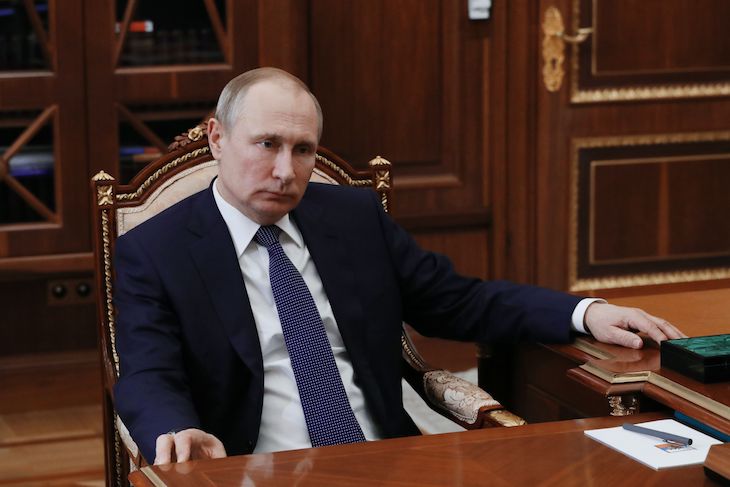A decade ago I commissioned an article about Vladimir Putin’s business cronies. Among other lines of enquiry, it sought to finger ‘a coterie of wealthy and politically influential industrialists, many believed to be former or current secret service officials’ who allegedly had shareholdings in Russian companies which, if we or anyone else had been able to prove that they were controlled by the president, might have evidenced a personal Putin fortune of tens of billions. Sensibly, The Spectator’s lawyer would not let me publish — but the US Treasury has now done its own version of the job by imposing sanctions on seven oligarchs and 17 senior Russian officials who are believed to form the innermost presidential clique.
The Who’s Who of Kremlin favourites has changed many times over the years, but it’s gratifying to note that one of those seven oligarchs also featured large in our unpublished exposé: he is Vladimir Bogdanov, a Putin chum since early St Petersburg days and president of Surgutneftegaz, the Siberia–headquartered oil company which keeps huge reserves of cash and whose owner-ship has long been shrouded in mystery. Then there’s Igor Rotenberg, son and heir to Putin’s boyhood judo partner Arkady Rotenberg — who I once congratulated here for winning multiple construction contracts, worth more than $7 billion, at the 2014 Sochi Winter Olympics.
And of course, most prominently, there’s our old sparring partner Oleg Deripaska, the prince of Russian aluminium. When he listed his master company Rusal in Hong Kong in 2010, I observed that it ‘set a new benchmark for just how risk-laden a stock can be and still gain access to public markets’ and that the only analytical tool with which to address such an impenetrable offering ‘must surely be a very long bargepole’. When he listed his new master company EN+ (by now the majority owner of Rusal) on the London Stock Exchange last November, I suggested that ‘the City shouldn’t be doing business with anyone so close to Putin’s Kremlin’, particularly when the £1 billion proceeds of the float were flowing back as debt repayments to Russian banks that were already subject to US and EU sanctions following Russian aggression against Ukraine. I gather MI6 made the same point, but to no avail.
Since the new US sanctions were announced, Rusal and EN+ shares have plunged and Deripaska’s personal worth is down by a couple of billion — while a legion of bankers and PR men who collected fat fees from him have presumably been shredding their files. What’s striking about this story is not that the US authorities are finally closing in on Putin’s circle, but that the entire oligarch class, whose concentration of unmerited economic power represents such a stain on capitalism and such a blight on their own homeland, should have been allowed to swagger abroad for so long.London — City and West End, as it were, in all their aspects — has a lot to answer for.
Sorrell vs Branson
If you were asked to list entrepreneur-led British businesses of the current generation that have achieved global impact, you might name Virgin and the advertising giant WPP but I suspect you’d struggle to come up with a third or a fourth. And you’d have to admit that Virgin is actually a brand rather than a business, a nebulous thing that has been attached over the years to everything from aircraft and trains to record shops, cola tins and wedding dresses in a web of ventures whose only commonality is the marketing genius of Sir Richard Branson.
WPP, on the other hand, isn’t even an abbreviation — having long since ceased to stand for Wire & Plastic Products, the listed shell company on which it was founded. But it is a vast conglomerate with a market capitalisation of £15 billion and a portfolio of famous agencies, including J. Walter Thompson and Ogilvy & Mather, that make it a world leader of its industry. And it is wholly the creation of 73-year-old Sir Martin Sorrell, the tireless London-born dealmaker who has driven its growth ever since he resigned as finance director of Saatchi & Saatchi to strike out on his own in 1985.
That gives Sorrell a special niche in the pantheon of British corporate chiefs. And any journalist who has had dealings with both him and Branson (as I have) will tell you that whereas Virgin’s bearded guru is remote, heavily guarded and strangely difficult to talk to, the WPP tycoon is instantly (indeed almost uniquely) accessible by email and mobile phone. So we have tended, over the years, to give him a positive press, even in relation to an annual pay package that peaked in 2015 at £70 million — and we’re watching now with curiosity as he faces allegations of ‘personal misconduct’, reported to concern supposed improper use of company funds.
WPP’s board has instructed lawyers to investigate the allegations, which Sorrell ‘unreservedly’ denies, and no more can be said on the subject for now. Except perhaps that the relentless money-making instinct of a Sorrell or a Branson is always likely to fuel expectations of a fall. But whereas Branson (after Virgin Music’s unhappy but brief encounter with the stock market in the 1980s) has kept his business and his fortune entirely private, Sorrell still operates as the salaried chief executive of a FTSE100 company of which he owns just 2 per cent and whose shares have fallen almost 40 per cent since early 2017. After 32 years in the saddle, and for all his remarkable achievements, that’s a very exposed position.
Airport chaos
Spring is here, or it was for a couple of days, and with the daffodil blooms came a clutch of airport stories. Gatwick’s runway closed because the sole air traffic controller on duty was entitled to a two-hour break. Stansted arrival and baggage delays afflicted thousands of angry passengers. And at Bristol, a meet-and-greet parking service was caught dumping cars in fields and lay-bys. At last, the holiday season is in sight!
Got something to add? Join the discussion and comment below.
Get 10 issues for just $10
Subscribe to The Spectator Australia today for the next 10 magazine issues, plus full online access, for just $10.
You might disagree with half of it, but you’ll enjoy reading all of it. Try your first month for free, then just $2 a week for the remainder of your first year.















Comments
Don't miss out
Join the conversation with other Spectator Australia readers. Subscribe to leave a comment.
SUBSCRIBEAlready a subscriber? Log in